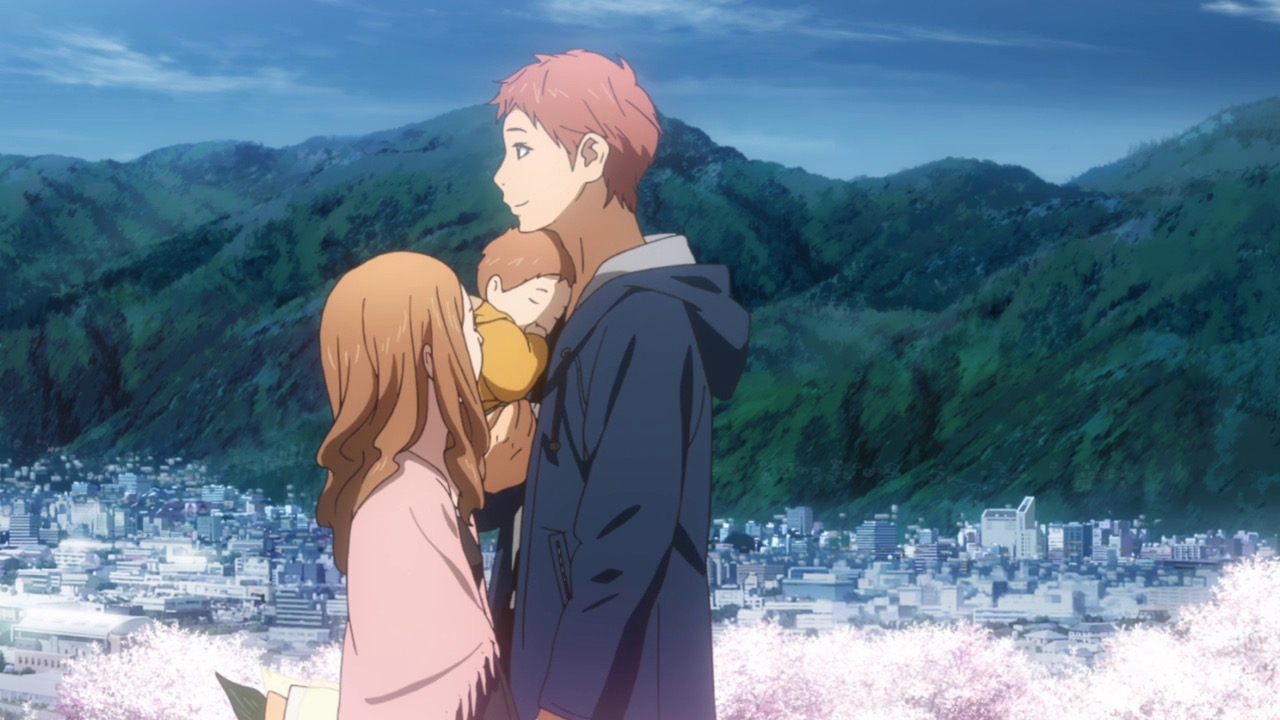Takamiya Naho received a letter ten years from the future. What was even more uncanny was that she wrote the letter for herself. There were instructions in the letter about saving a transfer student named Naruse Kakeru.
At first she didn’t believe it. The Naho from the future expressed her regret of failing to do a lot of things and for not making the right decisions. The letter tells the young Naho to do her best to make Naruse happy. She found out how important the message was when she read that Naruse would no longer be around ten years from now.
 |
| Naruse Kakeru and Takamiya Naho |
 |
| Naho and Suwa Hiroto with baby from the future |
Orange is a sad tale of friendship, loss and young love. It takes the character type of Naruse, a lead male character who has a painful past, even further. It explored the helplessness of depression, a psychological illness greatly misunderstood by most people. Naho on the other hand does not have qualities that set her apart from other lead female characters of the romance genre.
The idea of altering the past is not a new approach to storytelling but it was still refreshing considering how it’s rarely used in romance. I like that it didn’t dwell much on the mechanism of time travel because it did away with the trouble of explaining how it works (it’s not the focus of the story after all). Instead it highlighted the emotional and psychological impact on the characters from the past and the future. I was skeptic about the paradox created by such an idea but I was given a satisfying answer (well, more like I came up with the solutions myself) towards the end.
 |
| From left back: Hagita Saku, Chino Takako, Suwa From left botton: Naho, Naruse and Murasaka Azusa |
The implications of changing the past can be both painful and inspiring. When one gains something, someone loses. It can’t be an even exchange. That I think was what had drawn me to the series.
This 13-episode series is not exactly the best I’ve seen but Naruse’s character was the best portrayal of a person suffering depression and anxiety. It’s a subject that has been misinterpreted and avoided in media. Some portrayals are simply insulting and the so-called depressed characters are just sulky in general. Naruse is the best example I’ve seen so far. It won’t surprise me if viewers cannot sympathize with him. The depressed are usually so deep into their condition that reaching out will take a lot of effort on the part of friends and loved ones. What seems stubborn and overreaction is almost exactly what happens when a depressed person reacts. Bravo for that!
The effect of changing the past might be able to help Naruse but another character, Suwa Hiroto, also has to make a painful choice. I believe in giving love a chance so I was also rooting for Naruse. But sacrificing someone’s happiness is something I wouldn’t want anyone to do so I feel Suwa’s pain. I will leave it up to you to decide if it’s unfair for Suwa or if it’s a valiant move. That is the appeal of the series after all.
Rating: 8 out of 10




No comments:
Post a Comment
Comments are always welcome! Please keep it clean.